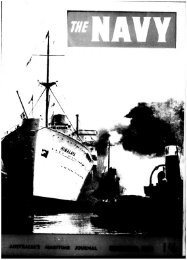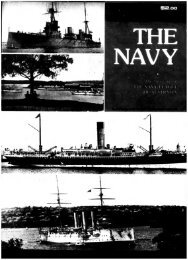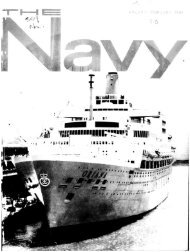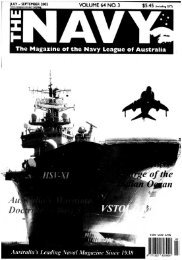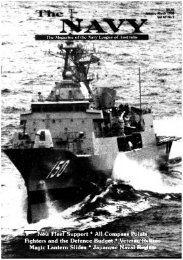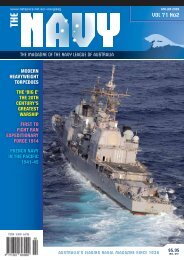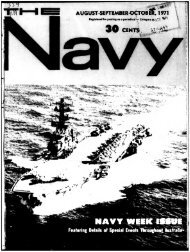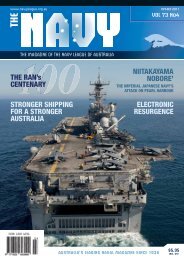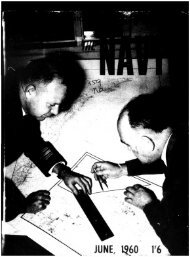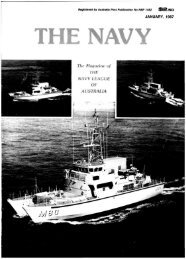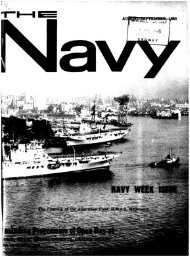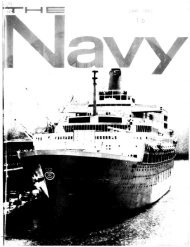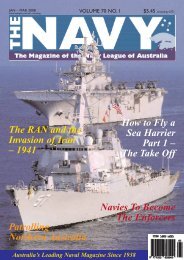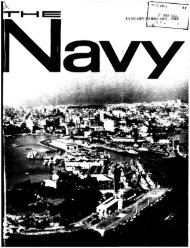The Navy Vol_37_Part1 (Feb-Mar-Apr, May-June-July 1975)
The Navy Vol_37_Part1 (Feb-Mar-Apr, May-June-July 1975)
The Navy Vol_37_Part1 (Feb-Mar-Apr, May-June-July 1975)
- No tags were found...
You also want an ePaper? Increase the reach of your titles
YUMPU automatically turns print PDFs into web optimized ePapers that Google loves.
<strong>The</strong> Honourable Lance Barnard,Australia \ Minister for Defence.Due to the increasing and critical attention being givento defence matters by responsible sections of the newsmedia in recent months, it would not be surprising if theAustralian community had a sense of uneasiness about thestate of the Armed Services. <strong>The</strong> calibre of many of thepersons commenting on defence issues certainly justifiesattention to the subject.In the main, the concern beingexpressed does not relate to thepresent state of the Services, butrather to their future capacity toprovide Australia with a credibleDefence Force. <strong>The</strong> effectiveness ofthe Services at any given timedepends largely on decisions madeyears beforehand, and it is towardthe current decision-making areathat criticism appears to be directed.Responsibility for national defencelies first and foremost with theFederal Parliament. In normalpractice, major defence decisionsare made and put into effect by theGovernment of the day. which issubsequently accorded credit orblame for whatever measures ittakes, or fails to take as the case maybe. At the moment however theSenate is not without influence onGovernment actions, and to someextent this spreads the responsibilityfor defence over the wholeParliament — in praciice as well asin theory.<strong>The</strong> ability of a Government tomake realistic defence decisions —from determining its priority in theoverall Government programme toapproving or disapproving majorequipment proposals — dependsvery much on the understandingmembers have of the various issuesinvolved, the Ministry of coursehaving particular responsibilities inthis regard.<strong>The</strong> Governments principaladviser on defence matters is theDepartment of Drfence. and as thedefence organisation is currentlybeing re-structured it is perhapstimely to refer to the links betweenthe Armed Forces and the Government.Prior to December 1972 "defence"'was well represented in the Ministry,no less than five Ministers (forDefence. <strong>Navy</strong>. Army. Air andSupply) having direct responsibilitiesfor matters connected withnational security. In addition tothese five Ministers, in the lastMcMahon government seven othershad held the Defence. Service, orSupply portfolios (the PrimeMinister himself was a former <strong>Navy</strong>Minister): In short, nearly half theMinistry of 27 members had defenceadministrative experience and werefamiliar with defence issues.This situation changed abruptlywhen the Labor Party assumedoffice, and one Minister was givenresponsibility for the five departmentsin the defence group (four —<strong>Navy</strong>. Army. Air and Supply subsequentlyceased to exist as separateDepartments of State — a reversionso far as the <strong>Navy</strong> is concerned to itssituation between 1901 and 1915.and 1921-1939 when it was a part, asit is once again, of the DefenceDepartment). Currently the DefenceMinister has an assistant who hasimportant ministerial responsibilitiesof his own in another areaof Government.It would be difficult to dispute thatat the present time, if only fornumerical reasons, the defence" voice" in the Government andtherefore in the Parliament, hasbeen greatly weakened.Apart from the fewer direct linksbetween the Armed Forces and thePage Thirty-four THE NAVY <strong>Feb</strong>ruary/Ma rch/<strong>Apr</strong>il, <strong>1975</strong>Government and some loss ofinfluence as a result, the administrativeburden imposed on a single"full-time" Minister must surelycreate other problems when the complexityof modern defence forces isconsidered, together with theimmense costs involved.<strong>The</strong> Secretary of the DefenceDepartment (Sir Arthur Tange) in hisReport on the Re organisation of theDefence Group of Departments(which was accepted by the presentGovernment as the blueprint for thenew defence structure) refers to themagnitude of the Defence Minister'stask and pre-supposes the provisionof other ministerial assistance. It isnot however clear what the responsibilitiesof the "Mmister(s) Assisting"would be or where he (or they)would fit into the new organisationHowever in a defence structure ofwhich the principal feature is aconcentration of managerialauthority in two persons —• theDefence Secretary and the Chief ofDefence Force Staff — who areresponsible to the Defence Minister,it would appear that they would haveto be "placed" between the Ministerand his two principal advisers (theSecretary and CDFS) which wouldnot seem helpful to anyone<strong>The</strong> "diarchy" form of defencemanagement (as opposed to theexisting "Board" system) has itselfbeen the subject of some criticalcomment and if. as the Secretarysuggests, the burden is too much forone Minister, the same commentmight apply equally to the Secretaryhimself, who is to be given verymuch greater responsibility over thewhole defence area than any otherPublic Servant hithertoBest wishes to al' <strong>Navy</strong> Personnel from theSOMERSET HOTEL(Mine holt: Bruce McFarlane)Bearing these factors in mind, notleast the desirability of increasingGovernment involvement indefence administration in a practicalway. it is possible that ourdefence interests would be bestserved by a Defence Council withauthority similar to that currentlyinvested in the separate ServiceBoards.Defence Councils are by no meansa new innovation and exist in anumber of countries with integratedArmed Services, includingBritain whose form of Governmentand Service structures are verysimilar to our own. An AustralianDefence Council might be comprisedas follows:—Minister for DefenceMinister with PersonnelresponsibilitiesMinister with LogisticsresponsibilitiesAir Conditioned Luxuriant Lounge — CounterLunches and Teas — Congenial Atmosphere197 PULTENEY STREETADELAIDETelephone: 223 2768Chief of Defence ForceStaffChief of Defence DeptSecretary of Defence DeptChief of Naval StaffChief of Air StaffChief of Army Staffand possibly. Chief Scientific Adviser<strong>The</strong>re have been suggestions thatthe proposed new defence organisationwill be unduly influenced by itscivilian element: Whether this is trueor not. the Defence Councilsuggested would clearly placemanagement responsibility whereit should be — on the representativesof the Government, on theprincipal professional officers, andon the head of the back-up organisation.<strong>The</strong> Parliament will soon be calledupon to determine these veryimportant matters, and it wouldappear to be in its own interests togive the subject the closest study."Skill in naval affairs, as in other crafts, isthe result of scientific training. It isimpossible to acquire this skill unless thematter be treated as of the first importanceand all other pursuits are considered to besecondary to it."Thucydides c 404 BCBy Courtesy ot .PEOPLES PALACECentrally Situated•TV Lounge • Laundry Facilities "FamilyConcessions • Car Parking AvailableSituated at91 PIRIE STREETADELAIDE, SATelephone: 2231424Fabruary/<strong>Mar</strong>ctt/<strong>Apr</strong>il, <strong>1975</strong> THE NAVY Pace Thirty-ftve



